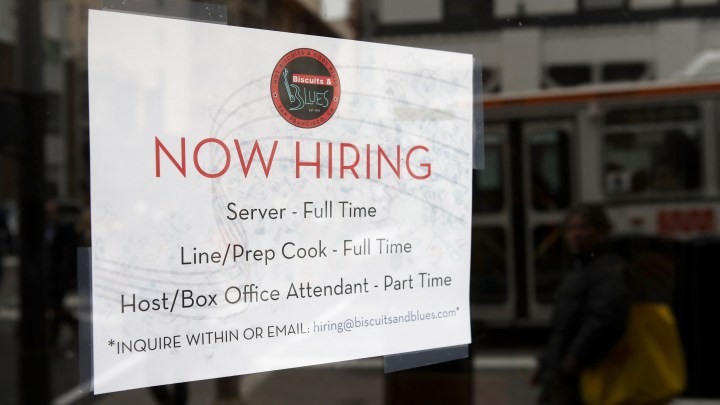
Could the tight labor market finally ease?

On Friday, we’ll get the government’s jobs tally for the month of May. Earlier this week, the Labor Department reported that in April, the number of job openings was a near-record high — a sign that many companies are still struggling to find workers. But that could be starting to change.
In some sense, the labor market hasn’t changed all that much in the past year. For instance, the rate at which people have been quitting their jobs has been hovering near record highs since April of 2021.
“We have a lot more firms that are looking for workers than we have workers who are looking for firms,” said Peter Orazem, an economics professor at Iowa State University.
That said, the total number of jobs open in April this year fell — especially in retail, food and accommodation, and health care. It could be a sign that the extremely tight labor market is finally starting to loosen up, according to Sarah House, senior economist at Wells Fargo.
“We’re starting to see employers at least not feeling like they have to hire at such a frenetic pace as what we saw in the second half of last year,” said House.
There are a few forces that could continue to bring the supply of labor back in line with demand, House said. For one, companies might not need as many workers if the economy slows down.
“And you just don’t have as much demand, and that helps bring the labor market in better balance,” she said.
Plus, a lot of people that left the labor force might start looking for work again. That would bring up the supply of available workers who might now feel safe returning to work or who might need the paycheck.
“So, the fact that we have had inflation running at the highest rate we’ve seen in 40 years, I think that could push some folks back into the labor market,” House said.
In particular, the millions of older workers who had to stop working early in the pandemic, per labor economist Teresa Ghilarducci at the New School.
“If their health care costs start going up, that would induce an older worker to get pretty freaked out and work more hours and hop back into the labor force,” said Ghilarducci.
Meanwhile, Ghilarducci said many younger workers are seeing their wage gains get eaten away by inflation. “If we truly had a labor market where employers were searching for scarce workers, we would see them having to dip into profits, and we would be seeing much higher wage increases.”
And if companies don’t choose to hike wages to counter inflation, Ghilarducci said that’s a sign that employers aren’t all that desperate for workers after all.
There’s a lot happening in the world. Through it all, Marketplace is here for you.
You rely on Marketplace to break down the world’s events and tell you how it affects you in a fact-based, approachable way. We rely on your financial support to keep making that possible.
Your donation today powers the independent journalism that you rely on. For just $5/month, you can help sustain Marketplace so we can keep reporting on the things that matter to you.

















